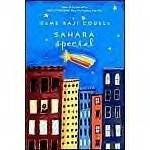
Exactly what am I getting myself into here? I have been thinking about developing a system to get through more books lately (I'm usually so random, and--admittedly do read a lot of trash with the good). Even though I'm 28 years old, my favorite books are always kids' and teen fiction. Upon reflection, I was aghast that I had only read a handful of the over 300 Newberry winners and honor books. I have decided to endeavor to read all books that have been named winners or runners up since the founding of the award in 1922. No small task. The only exemption I am allowing myself is if a book is completely out of print and unavailable. On top of this, if that were not crazy enough, I plan on covering all 30+ books that have been honored by the Michael Printz Award for young adult fiction. If you are an adult, and like to read, I encourage you to pick up a few of these books and enjoy them with an open mind.
The Higher Power of Lucky
 The first book I would like to cover is the most recent Newberry winner, The Higher Power of Lucky by Susan Patron.
The first book I would like to cover is the most recent Newberry winner, The Higher Power of Lucky by Susan Patron. Higher Power is about Lucky, a ten year old girl whose mother has passed away, and whose father is not interested in her at all. As a matter of fact, Lucky is so without parents that her father's first wife has become her guardian. Lucky's favorite pasttime is eavesdropping on the local 12-step progam meetings, and honestly, in a town with a population of 43, I would imagine that might be mine, too.
Lucky keeps hearing testimonials in the meetings about how each attendant finds their "higher power" and turns their life around. This urges Lucky to find her higher power.
This was such a sweet story, with a wonderful message that shows even though a girl, family, or town may not be the norm, they still have the ability to find their higher power.
I would be remiss to ignore the backlash against this book(as much as I would like to), but I am sure there are legitimate concerns before reading the book about content. Here is an excerpt from the Yahoo News article concerning the content issue:
Yes, controversy sells. Criticism of an award-winning children's book over the word "scrotum" has brought Susan Patron's "The Higher Power of Lucky" into the top 40 on Amazon.com.
"The Higher Power of Lucky" is the story of a 10-year-old girl in rural California and her quest for "Higher Power." The opening chapter includes a passage about a man "who had drunk half a gallon of rum listening to Johnny Cash all morning in his parked '62 Cadillac, then fallen out of the car when he saw a rattlesnake on the passenger seat biting his dog, Roy, on the scrotum."
The AP contacted several librarians who had criticized "Higher Power" on LM_Net. All said they either have it(as opposed to banning it) or were still deciding. Even Nilsson, who complained of the book's "Howard Stern-type shock treatment," told the AP that she is carrying it, although she questions whether it was worthy of a Newbery. Nilsson also said that she didn't know of anyone who had refused to stock it.
In a statement on their website, the American Library Association chose to respond to their choice of winner and its content thusly:
Recent media coverage failed to discuss the true value of the 'Higher Power of Lucky,' by Susan Patron. The author’s use of one word should not prevent children from having free access to this remarkable piece of children’s literature. Children and their families should be given the opportunity to read this book and develop their opinions.
"The 'Higher Power of Lucky' is a perfectly nuanced blend of adventure and survival, both emotional and physical. It is a gently humorous character study, as well as a blueprint for a self-examined life. The book serves as a reminder that children support one another just as adults do.
"Libraries are about inclusion rather than exclusion. The freedom to read, speak, think and express ourselves is core to our American values. Part of living in a democracy means respecting each other’s differences and the right of all people to choose for themselves what they and their families read.
Now, my opinion:
I was prepared to be upset or disturbed by all of this while reading Higher Power. As a matter of fact, I-a bookseller- picked this book up with the sole purpose of being educated when responding to parents' concerns about content. I now feel perfectly safe recommending it for most kids. The word is used three times, once in the above statement, once to state that after hearing the story about Short Sam and his dog, Lucky did not know what it meant, and once when she asks what it is.
The references are not graphic or excessive, but stated simply. It is a perfect example of how a kid hears something not intended for their ears, their contemplation of the meaning and the clarification of the meaning. I am pleased that the scientific term was used, instead of some ridiculous slang term that 5th grade boys would use (no offense, 5th grade boys!). The story far outshines the one word. I recommend that parents review the book before their kids, and determine for themselves if they want to pass it on. It's a great lesson for adults as well as kids.

 Prejudice and intolerance are the elephant in the room in this novel by Gary Schmidt. Turner, the new
Prejudice and intolerance are the elephant in the room in this novel by Gary Schmidt. Turner, the new 















